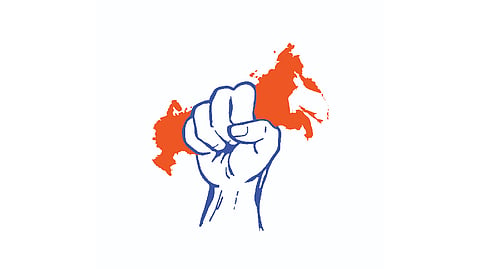

MOSCOW: Vladimir Milov, a Russian opposition politician who favours strong sanctions against Russia to stop the war in Ukraine, asked me this week to imagine I’m in the Amazon rainforest when a giant anaconda coils itself around me. What I should do, he said, is try to strangle the anaconda before it strangles me. “You don’t stop every five minutes and release your grip to see if it’s working. You just do it until the job is done.”
Likewise, Milov told me, the United States, the European Union and other allies should squeeze Russia with economic sanctions for as long as it takes to stop the Russian war machine in Ukraine.
The bad news is that complete success may take a very long time, Milov said. The good news is that the sanctions have already begun to squeeze. One way to see that is in the sliding value of the Russian ruble. The ruble has had its downs and ups. It fell immediately after Russia’s invasion, then surprisingly strengthened, mostly because a jump in oil prices increased Russian oil revenues. Lately, though, the ruble has lost some of those gains.
One reason the ruble has weakened is that Western sanctions on Russia’s energy sector are working. On Dec. 5, a European Union embargo and a Group of 7 price cap on Russian oil took effect. Russia, like other countries, sells its oil for dollars. It’s earning fewer dollars than before, but its need for foreign currency to pay for imports remains high. Since dollars have become relatively scarce, the value of the ruble in dollars has fallen. “The ruble will continue to weaken because there’s no fundamental demand” for it, Milov said.
Milov is an economist and an ally of Aleksei Navalny, the Russian opposition leader who was poisoned in 2020, evacuated for medical care and then imprisoned on his return to Russia. Milov served in the government of President Vladimir Putin in the early 2000s but soon after joined the opposition. He lives outside Russia because there’s a warrant for his arrest if he returns. He has a large following inside the country on YouTube, which is an important way that ordinary Russians get an uncensored picture of the world.
It isn’t just opponents of Putin who see the Russian economy weakening under the strain of the war, sanctions and softening oil prices. Mikhail Zadornov, who was minister of finance from 1997 to 1999, recently gave an interview to RosBusinessConsulting in which he predicted a 10 percent decline next year in the volume of oil production, which “will significantly affect both the budget and the economy.” Restrictions on what Russia can import are also pinching, he said. “It is clear that many enterprises were moving by inertia on stocks of materials and equipment. Now these stocks have run out or are running out. There are no new deliveries.”
Zadornov added, “Our television says with sarcastic joy that the Europeans are freezing. I do not quite understand what is there to rejoice. In fact, we are losing the markets that we have been building since the days of the Soviet Union.”
He is a credible source not only because of his service as finance minister but also because he was installed as chairman of Otkritie FC Bank, one of the nation’s biggest banks, after it was nationalized in 2017. (The central bank is selling it now, and Zadornov is stepping down.) “Zadornov is being explicit and open about many of these things. That is unusual,” Milov said.
Western sanctions on Russia are like the mills of God. They grind slowly, but they grind exceedingly fine.
Visit news.dtnext.in to explore our interactive epaper!
Download the DT Next app for more exciting features!
Click here for iOS
Click here for Android